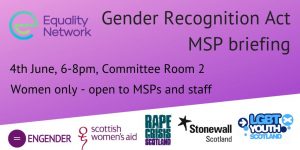Engender and Feminism

Ahead of this evening’s meeting in Parliament, which includes Engender and other organisations professing support for the proposed introduction of self-id of sex, we wish to express our concerns about the decisions of Engender, who describe themselves as “Scotland’s feminist membership organisation”.
Forwomen.Scot applied to join as an organisational member of Engender on 22nd August 2018. Some weeks later we were rejected and Engender swiftly updated their membership criteria to read:
“If you are an organisation which doesn’t work specifically on women’s issues, but support our aims and align with our broader values, we’d love to welcome you as an ‘affiliate member’. Please note, we cannot accept membership applications from single-issue groups that campaign against one of our policy advocacy positions. For example, we would not accept membership from a women’s group that campaigned to restrict access to abortion healthcare, to avoid causing confusion about Engender’s position on that issue.”
A non-feminist or non-women’s group which agreed to some extent with Engender’s political positions could join, but not a group founded on second wave or gender critical principles. Second wave feminism and radical feminism are recognised as valid academic and theoretical positions within feminist philosophy. Our “single-issue”, as Engender characterises it, is the fundamental feminist philosophy which holds that gender is a harmful construct which imposes damaging stereotypes on men and women; that women and men do not have gendered brains; and that sex is the root of many injustices such as FGM, unequal pay, sexual assault, disparity in healthcare research, forced marriage and much more.
The issue of self ID is, of course, hotly contested in feminist circles. It should not be controversial to argue that a theory that rejects the physical reality of sex will not enhance women’s sex based rights. Engender have adopted a position based on political concerns rather than feminist theory and are refusing membership to groups based on the political, anti-scientific and anti-feminist belief that sex is not the cause of female oppression.
It may be that Engender is not, as they advertise, a broad feminist organisation, but rather a third wave liberal feminist group. We would feel that precludes them for claiming to represent the entire feminist movement and should be a point of concern for the government who funds them.
It should also be noted, that Engender decided to support proposed changes to the GRA with no input or consultation with their membership (indeed, they cancelled a meeting which was never rescheduled) instead relying on advice from Scottish Trans Alliance and Equality Network – a group who claim that sex is “on a spectrum”.
When we learned that Equality Network proposed holding a meeting at the Scottish parliament titled “By women, for women” we, and other concerned organisations and individuals, including those working on front-line services, asked if we could attend to hear their proposals – much as Joan McAlpine invited a broad range of organisations to attend her meeting on the 22nd May. Equality Network, which has no remit to present itself as a group campaigning for women rights, refused all requests.
We believe that the behaviour of Engender, and the groups they choose to ally themselves with, in refusing to allow membership, or to even engage with the views of the vast majority of women in Scotland (over 80%) and a reputable branch of feminist theory, is discriminatory. It is extremely problematic that a group which claims to lobby for equal rights and representation for women cannot even define the term woman – indeed they are on record as stating that they do not represent women. Any organisation in receipt of over £200,000 of public money should be able to define those it apparently exists to serve and it should not act to discriminate against women or groups who insist on the need for evidence, impact assessments and proper data to record the effect of policy on women.
